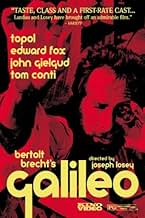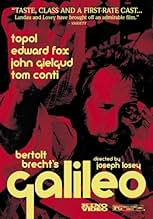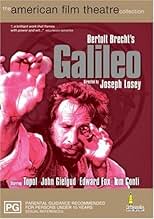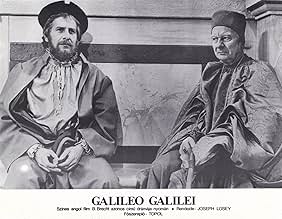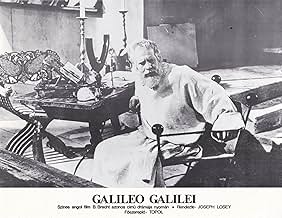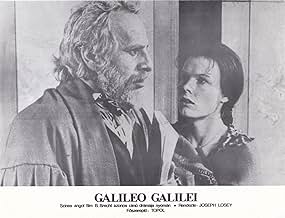Galileo Galilei, sus descubrimientos telescópicos, el apoyo a la teoría copernicana, el conflicto con la Iglesia Católica que llevó al encarcelamiento y su influencia en futuros científicos ... Leer todoGalileo Galilei, sus descubrimientos telescópicos, el apoyo a la teoría copernicana, el conflicto con la Iglesia Católica que llevó al encarcelamiento y su influencia en futuros científicos como Newton y Kepler.Galileo Galilei, sus descubrimientos telescópicos, el apoyo a la teoría copernicana, el conflicto con la Iglesia Católica que llevó al encarcelamiento y su influencia en futuros científicos como Newton y Kepler.
- Dirección
- Guionistas
- Elenco
Opiniones destacadas
Director Joseph Losey had directed its Broadway debut eight years earlier, and it's offered as a stage show, albeit with cinematographer Michael Rand offering a variety of angles and editor Reginald Beck trying his hardest.
It's one of those shows that is a hagiography, as Topol ages and looks weary, but maintains his childlike wonder. It's got some stage luminaries giving restrained performances -- except for John Gielgud as an elderly, ranting cardinal. The great charm of this production is, of course, seeing these fine stage actors in their natural medium. With Edward Fox, Margaret Leighton, Clive Revill and Tom Conti.
Galileo is portrayed as an opportunistic genius who is not above stealing someone else's invention and claiming it as his own if it will profit him. He is self-indulgent and corrupt, but he is still a scientist. When his theories of the nature of the universe conflict with the Church's, he recognizes that this may upset not only the way people view the sky, but their own own position in the constellation of their society. Galileo hopes to profit from this, to become a new high priest of science. But when threatened with torture by the Inquisition, a threat the Inquisitors know they dare not carry out because of Galileo's popularity, Galileo capitulates out of the fear of physical pain. His work is confiscated by the Church to be locked away from the people, his recantation is published and the incipient revolution he inspired dies away. Galileo is granted a small pension and forbidden to do any real scientific work.
Years later, Galileo is visited by a former assistant who tells him of the chilling effect his recantation had on scientific progress everywhere in Europe, that no one dares to express any dissident viewpoints. Galileo removes a copy of his scientific treatises from a hiding place and gives it to the assistant to smuggle out of the country. Galileo tells him he has spent many years secretly reconstructing his findings, waiting for someone to give them to. The assistant's tone instantly changes and he lauds Galileo for surviving the Inquisition so his work would not be lost. But Galileo refuses to accept these congratulations and condemns his recanting of the truths he had discovered. He says he knows now that he was never truly in danger and that his personal cowardice led to the continuation of oppressions of all kinds in society as well as the corruption of scientific discovery. He wonders what he and others scientists might have accomplished for the good of all if only he had stood up for the truth when he had the chance to do so. As the assistant leaves with the treatises, Galileo cautions him not to tell anyone where he got them. Galileo still fears reprisals from the powers that be and the loss of his minimal comforts. "...Your cheering at some new achievement would be echoed by a universal howl of horror," Galileo tells his former assistant. "I have betrayed my profession. Any man who does what I have done must not be tolerated in the ranks of science." This all supports playwright Brecht's leftist views, of course, but also accurately reflects the ambivalence of many of the A-bomb scientists about their creation.
"Galileo" was made by the American Film Theatre, the brainchild of producer Ely Landau. The AFT films were shown only in selected movie theaters to audiences who paid a subscription fee for a series of 6 plays on film a year. The AFT series ran from 1973 to 1976. These films were not simply filmed stage productions, nor were they "Hollywoodized" to increase viewers. They used the text of the plays as written by their authors. However, they also used cinematic techniques (close-ups, pans, dolly shots, etc.) to focus the audience's attention on important characters' expressions, reactions and interactions with other characters.
Other plays in this series include "The Man in the Glass Booth", for which Maximilian Schell received a Best Actor Academy Award Nomination, Jean Genet's "The Maids" with Susanna York and Glenda Jackson (I think) an
This is like a play or at least a staged film. There are those three singing boys introducing each section. After all, it is based on a play. The story unfolds episodically in nature. Some of this may be educational. The general story is familiar to me. This British film is filled with solid actors, but the tension isn't very high.
¿Sabías que…?
- TriviaJoseph Losey had also directed the original Broadway production of "Galileo," 28 years previously.
- ErroresAfter the crier announces Galileo Galilei's recantation, a chessboard is seen on the left side of the screen: all the pieces are upright. As Galileo enters, a new shot shows that one of the pieces has been toppled. In the next shot, all the pieces are again upright (1:57:50-1:58:10).
- Citas
Andrea Sarti: [upon Galileo's recantation] Unhappy is the land that has no heroes.
Galileo Galilei: Incorrect. Unhappy is the land that *needs* a hero.
- ConexionesFeatured in Zomergasten: Episode #23.1 (2010)
Selecciones populares
- How long is Galileo?Con tecnología de Alexa
Detalles
- Fecha de lanzamiento
- Países de origen
- Idioma
- También se conoce como
- Galileo Galilei
- Locaciones de filmación
- Productoras
- Ver más créditos de la compañía en IMDbPro
- Tiempo de ejecución2 horas 25 minutos
- Mezcla de sonido
- Relación de aspecto
- 1.85 : 1
Contribuir a esta página



